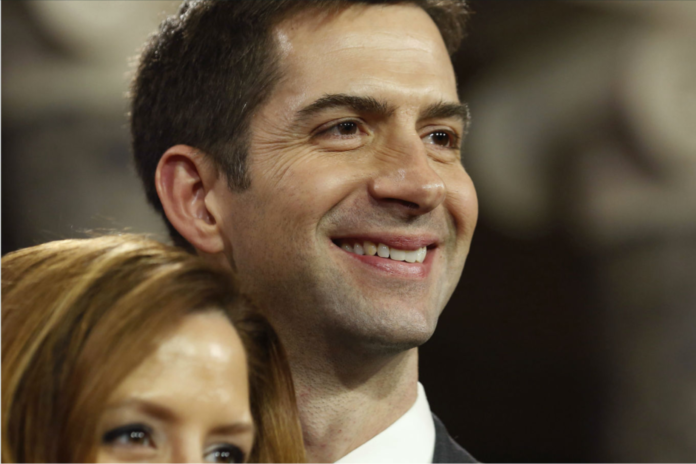This essay was originally delivered as a speech in the U. S. Senate on June 19, 2019.
Many state legislatures across the country have taken action recently to protect unborn babies from the violence of abortion. My home state, Arkansas, has just passed a law protecting unborn babies after eighteen weeks of development. And this reform is not just supported by Arkansans. It’s supported by a large majority of all Americans, more than 70 percent of whom believe unborn babies ought to be protected at or before that stage of pregnancy.
These reforms are the work of the pro-life movement, which fights for the most vulnerable among us every day. The pro-life movement seeks to change the laws of our country in the noblest tradition of our country, working within our democratic system so that our laws ultimately live up to our highest principle: that “all men are created equal,” in the words of our Declaration. That all have a basic right to life.
But of course, this is a democracy, so not everyone agrees upon when or even if we ought to protect the unborn. I understand that. I know there are decent people on both sides of this sensitive issue. We resolve our differences and reach compromises through democratic debate. What should never happen, though, is billion-dollar corporations trying to dictate these moral questions to us. Politically correct CEOs shouldn’t be in the business of threatening normal Americans.
But that’s exactly what we’ve seen lately. The loudest objections to these pro-life laws haven’t come from the “bottom up”—from normal citizens who happen to disagree with one another—but from the “top down”: from cultural elites, and increasingly from giant corporations who wield their economic power as a weapon to punish the American people for daring to challenge their pro-abortion extremism.
Giant media companies like Disney, Netflix, and Warner Media have threatened to cripple Georgia’s film industry if its residents don’t bend the knee and betray their pro-life convictions. And just last Monday, the New York Times ran a full-page advertisement organized by the pro-abortion lobby and signed by the CEOs of hundreds of companies saying that legal protections for unborn babies are “bad for business.” How disgusting is that? Caring for a little baby is “bad for business.”
Now, I get why outfits like Planned Parenthood or NARAL would say babies are “bad for business.” Abortion is their business, after all, and they’re just protecting their market share. But what about those other CEOs? Why do they think babies are “bad for business?”
Perhaps because they want their workers to focus single-mindedly on working—not building a family and raising children. All these politically correct CEOs want company men and women, not family men and women. They’ll support your individuality and self-expression just so long as you stay unattached and on the clock.
You couldn’t find a more perfect example of this than &Pizza, one of the companies whose CEO signed the pro-abortion ad. &Pizza doesn’t even offer paid maternity leave to all its employees—but it does celebrate their “oneness” and “individuality.” It’ll even pay employees to get a tattoo of the company logo. So if you want to be a walking billboard for your employer, &Pizza will foot the bill. But if you’re pregnant with a child, tough luck. In the spirit of some of these CEOs, I might call for a boycott of &Pizza and its political correctness. But you could just skip them because their pizza is lousy, anyway.
There’s a troubling trend among giant corporations using this wealth and power to force liberal dogma on an unwilling people. As liberal activists have lost control of the judiciary, they have turned to a different hub of power to impose their views on the rest of the country. This time it’s private power, located in a few mega-cities on the coasts.
And that’s not an exaggeration. The overwhelming majority of companies that lashed out against the pro-life movement in that New York Times ad are headquartered on the coasts, hoping to rule the rest of us like colonies in the hinterlands. More than three-quarters are headquartered in New York or California alone. More than a dozen are foreign companies. Yet those same companies presume to tell all of America what we should think.
And for some reason, this outrage only seems to go in one direction. As states like Arkansas have passed pro-life laws, other states have sadly gone down a different path, stripping unborn children of recognition and protection under the law. States like New York, Illinois, and Vermont recently passed laws declaring abortion a “fundamental right,” accessible until moments before birth for practically any reason as long as you have a doctor’s note.
We have already begun to see the consequences of these laws, which strain so mightily to defy and deny the humanity of the unborn. In New York City, prosecutors recently dropped a charge of abortion against a man who brutally stabbed to death his girlfriend and her unborn child. They dropped that charge because the pro-abortion law that had just passed the legislature in Albany removed all criminal penalties for killing an unborn child. According to the laws of New York State, that woman’s child never existed.
Pro-abortion laws passed in New York, Illinois, Vermont, and elsewhere truly deserve the label “radical.” So why isn’t the national media covering these radical laws with the intensity they’ve reserved for states like Georgia? Where are the indignant CEOs who profess to care so much for their female employees? Nowhere to be found, because their outrage is very selective. They don’t speak for the majority of Americans, much less for women. Instead, they’re actively trying to force a pro-abortion agenda on an unwilling public.
These companies want to wield a veto power over the democratic debate and decisions of Arkansans and citizens across our country. They want to force the latest social fashions of the coasts on small towns they would never visit in a million years. They want us to betray our deeply held beliefs about life and death, in favor of a specious account of “equality.” If there’s one thing the New York Times ad got right, it’s that “the future of equality hangs in the balance” when it comes to abortion. But their idea of equality doesn’t include everyone: It omits and degrades unborn babies as expendable, lesser than, even “bad for business.” That’s a strange kind of equality, if you ask me.
This trend of intolerance ought to alarm everyone, no matter your views on this sensitive question. It threatens democratic debate on this question, and ultimately on all questions.
But despite the pressure campaign waged against us, I’m heartened, because I know the pro-life movement will carry on as it always has, speaking to the inherent dignity of every human life. Not everything can be measured on a corporate balance sheet. Some things are bigger than the bottom line or what wealthy corporations consider “bad for business.” The cause of life is one of those issues worth fighting for.
Tom Cotton is the junior United States Senator for Arkansas.











